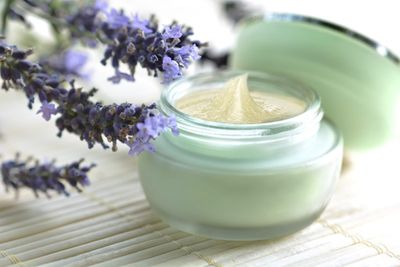Creating a Cosmetic Garden
Herbal and botanical extracts in beauty products have become increasingly popular. I know that I have paid a little extra for hair or skin products simply because the label boasts being made of this or that plant extract. Odds are, most of us are already growing some plants that have healing benefits for skin or hair in our gardens or flowerbeds and don’t even know it. You don’t need to be a botanist or chemist to take advantage of these natural beauty products – dried, ground plants can be added right to the beauty products you already have. A beauty garden can be as big or small as you want it. You can designate a whole flowerbed to plants that will be used for beauty or you can just mix a few favorites into existing beds. A beauty garden can be as simple as a few plants growing in pots in a windowsill or on a balcony.
Plants for Beauty Gardens
Below is a list of some plants for beauty gardens and their cosmetic benefits:
Aloe Vera – calms and repairs skin. Use on burns, cuts, rashes, and wounds. It’s a natural moisturizer. Arnica– soothes inflamed skin. Use to treat cuts, bruises, rashes. Burdock– root contains vitamin C, biotin, vitamin E. It is a natural antibiotic and antimicrobial. Use to treat acne, eczema, psoriasis, rashes, wounds, bruises, insect bites. Also treats dandruff. Calendula– use flowers and leaves to soothe skin inflammations, burns, acne, rashes, wounds, insect bites, eczema. In hair care, it has a lightening effect on dark hair. Catmint– leaves promote hair growth, soothes itchy irritated scalps and skin. Chamomile– leaves and flowers are a natural anti-inflammatory, astringent and antiseptic. Cleans, heals, and soothes skin. Reduces puffy eyes. In hair care, it softens and lightens hair. Chickweed – normally viewed as a weed, the leaves and flowers are anti-inflammatory. They contain vitamin C, Vitamin A, PABA, biotin, Vitamin D, and zinc. The plant also contains saponins, which make it a natural soap. It is a natural moisturizer and draws toxins from the skin. Use to treat wounds, burns, rashes, insect bites, acne, varicose veins, shingles, and warts. Soothes puffy, irritated eyes. Comfrey– natural anti-inflammatory. The leaves and flowers also promote skin cell regrowth. Use on wounds, burns, acne, psoriasis. Leaves moisturize and repair dry damaged hair. Dandelion– flowers, stems and milky sap are anti-inflammatory and antiseptic. Use to treat cuts, burns, insect bites, acne, and rashes. Also revitalizes and moisturizes tired, dry skin. Improves circulation. Softens and moisturizes hair; flowers can also be used as a dye for blonde hair. Note: sap may cause skin irritation in sensitive individuals. Elderberry– softens and soothes the skin. Fades dark marks and scars. Moisturizes hair. Elderberry fruit can be used as a natural hair dye for dark hair. Echinacea– roots and flowers are used to regenerate skin cells and reduce inflammation and acne. Garlic– in hair care, garlic treats dandruff. It is also a natural fungicide and can be used as a soak for athlete’s foot. Lavender– natural anti-inflammatory and antiseptic properties. Cleanses and soothes skin. Use to treat acne, cuts, burns, stretch marks, and wrinkles. Also great additions to soaps and creams. Lemon Balm – natural astringent, used in soaps for its healing effect on the skin and its lemony scent. Lemongrass– antimicrobial and antibacterial. Used in soaps and moisturizers. Shrinks pores, fights acne, and wrinkles. Natural fungicide. Lemon Verbena – used in moisturizers to repair tired, dry skin. Reduces puffy eyes. Stimulates circulation. Mallow– natural emollient. All parts of the plant are used to soften and soothe the skin and hair. Mint– antiseptic properties. Used in soaps or astringents to cleanse and soften skin and hair. Soothes acne or other skin conditions. Also used for its minty scent. Nettle– natural antiseptic and anti-inflammatory properties. Leaves are used to cleanse and refresh the skin and hair. Note: wear gloves when harvesting. Plantain– heals and soothes irritated skin. Used to treat cuts, burns, insect bites, and acne. Rose– flowers and rose hips are a natural astringent and moisturizer. Regenerates skin cells and fights wrinkles. Rosemary– natural anti-inflammatory, antiseptic and astringent properties. Soothes irritated skin, improves circulation, and stimulates skin cell and hair growth. Natural dye to darken hair. Sage– natural astringent and moisturizer. Softens skin and hair. Reduces oily build up. Treats acne and dandruff. Thyme– natural antiseptic, cleans, soothes, and heals irritated skin and scalp. Also used for its scent to repel insects. Yarrow– natural antiseptic and anti-inflammatory. Soothes and heals skin and scalp. Helps blood to clot on open wounds.
Disclaimer: The contents of this article is for educational and gardening purposes only. Before using ANY herb or plant for medicinal or cosmetic purposes, please consult a physician or a medical herbalist for advice.
